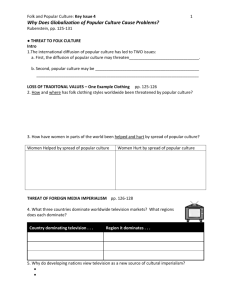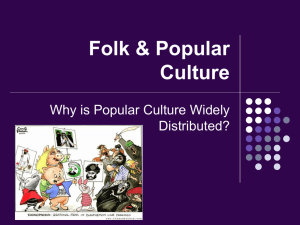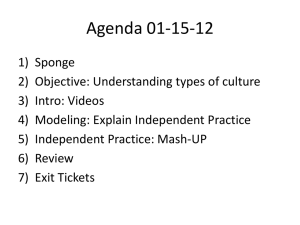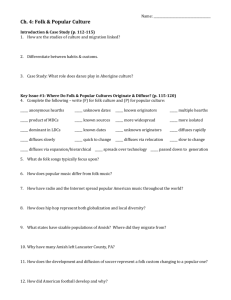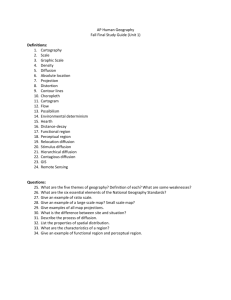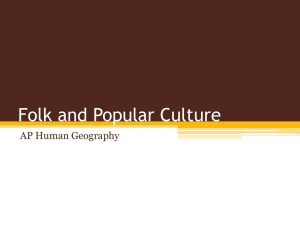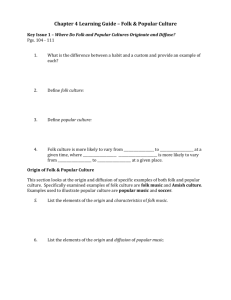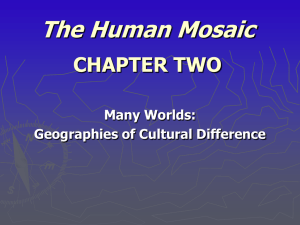chapter_4_learning_guide__ key _2
advertisement
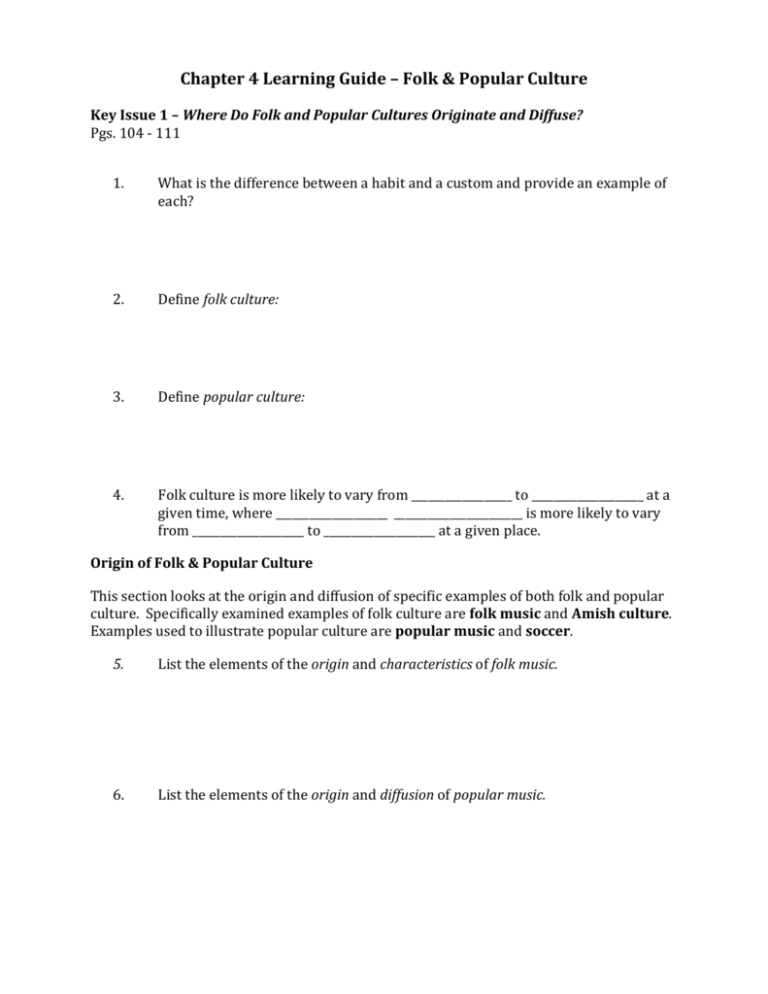
Chapter 4 Learning Guide – Folk & Popular Culture Key Issue 1 – Where Do Folk and Popular Cultures Originate and Diffuse? Pgs. 104 - 111 1. What is the difference between a habit and a custom and provide an example of each? 2. Define folk culture: 3. Define popular culture: 4. Folk culture is more likely to vary from __________________ to ____________________ at a given time, where ____________________ _______________________ is more likely to vary from ____________________ to ____________________ at a given place. Origin of Folk & Popular Culture This section looks at the origin and diffusion of specific examples of both folk and popular culture. Specifically examined examples of folk culture are folk music and Amish culture. Examples used to illustrate popular culture are popular music and soccer. 5. List the elements of the origin and characteristics of folk music. 6. List the elements of the origin and diffusion of popular music. 7. Shade and label the hearths of today’s Hip Hop music in the U.S. and label the location of the origin with a dot. Diffusion of Folk & Popular Culture 8. Where did Amish culture originate, and how did it diffuse to the United States? 9. In what ways is Amish culture distinct from the popular culture of the United States? 10. What is happening to the Amish in the United States today? 11. Label and shade the areas of larger Amish settlements in the U.S. 12. How was soccer transformed from a folk custom into popular culture? 13. Despite their anonymous folk origins, what characteristics of organized spectator sports today characterize them as popular culture? 14. Label popular sports with the countries in which they are most popular and with which they are best associated. Chapter 4 Learning Guide – Folk & Popular Culture Key Issue 2 – Why is Folk Culture Clustered? Pgs. 111 – 117 Influence of the Physical Environment 1. How does clothing style (in this case shoes) indicate the influence of the environment on folk culture? 2. List 3 different examples of food habits and the unique folk cultures each illustrates. 3. Indicate some food taboos, along with the cultures that practice them, in the chart below. Food Taboos Cultures/Regions Foods/Reasons 4. In what sense are building materials of folk housing unique? Isolation Promotes Cultural Diversity 5. Summarize how cultural diversity in the Himalayas is displayed in local art. 6. What cultural institution is shaping these differences? 7. What environmental conditions (which are the same for all groups here) are NOT ensuring similar art forms in this case? 8. Fred Kniffen, a cultural geographer, has identified three source regions for American folk housing styles: New England, Middle Atlantic and Lower Chesapeake. List the housing styles he identified with each region. New England (4 styles) – Middle Atlantic (1 dominant style) – Lower Chesapeake – Chapter 4 Learning Guide – Folk & Popular Culture Key Issue 3 – Why is Popular Culture Widely Distributed? Pgs. 117 – 125 1. In contrast to folk customs, popular customs diffuse ___________________ across the Earth’s surface to location with a wide variety of ________________ ________________. This diffusion depends, however, upon a group of people having a sufficiently high level of ___________________ _______________________ in order to obtain the ______________________ ___________________ associated with the popular custom. Diffusion of Popular Housing, Clothing & Food 2. Consumption of large quantities of what two food products are characteristic of popular culture? 3. How is each of these food preferences expressed regionally, according to culture? 4. In Western countries where popular culture predominates, clothing styles generally reflect ________________ rather than particular ________________________. 5. What are 3 facts about clothing styles associated with popular culture? 6. ________________ are an important symbol of the _____________________ of Western ______________________ _____________________. 7. Complete the chart below to indicate the decade(s) during which each housing style was dominant and a fact about the particular style of house. Style Minimal Traditional Decades(s) Facts Ranch House Split-Level Contemporary Style Shed Style 8. What are the Neo-eclectic styles of the 1960’s and 1970’s? Electronic Diffusion of Popular Culture 9. Give 2 reasons for which television is an especially significant element of culture. 10. Complete the chart with countries/regions using the bottom map on pg 123. Television is Universal Television is Common Television is Rare Using the bottom map on pg 124, answer #11 – 13. 11. Currently, where is the Internet most widely available? 12. In what regions will it most likely continue to grow? 13. What regions, then, does that leave as still relatively untouched by the Internet, in the foreseeable future? Chapter 4 Learning Guide – Folk & Popular Culture Key Issue 4 – Why Does Globalization of Popular Culture Cause Problems? Pgs. 125 – 130 Threat to Folk Culture 1. How and where has folk clothing styles worldwide been threatened by popular culture? 2. How have women in many parts of the world been helped by the spread of popular culture? How have they been hurt? 3. What 3 countries dominate worldwide television markets? What regions does each dominate? Country dominating television… Region it dominates… 4. Why do developing nations view television as a new source of cultural imperialism? 5. What are the world’s two largest newspaper organizations? What countries are they associated with? 6. In many parts of the world, what is the only reliable and unbiased source of news information? Environmental Impact of Popular Culture 7. How is the playing of golf and golf courses an example of a popular custom that is not generally in harmony with the local environment? 8. What is a uniform landscape? 9. How and why is this concept utilized by fast-food restaurants? 10. What are the two ways in which popular customs have an adverse effect on the natural environment? Chapter 4 Learning Guide – Folk & Popular Culture Key Issue 1 – Where Do Folk and Popular Cultures Originate and Diffuse? Pgs. 104 - 111 1. What is the difference between a habit and a custom? Habit is a repetitive act of an individual person – wearing jeans every day. Custom is a repetitive act of a group so much that it becomes characteristics of that group – college students wearing jeans every day. 2. Define folk culture: Practiced by small, homogeneous groups living in isolated rural areas. 3. Define popular culture: Found in large, heterogeneous societies that share certain habits despite differences in other personal characteristics. 4. Folk culture is more likely to vary from ____place______ to ___place_____ at a given time, where ____popular_____ ____culture___ is more likely to vary from ____time____ to ____time_____ at a given place. Origin of Folk & Popular Culture This section looks at the origin and diffusion of specific examples of both folk and popular culture. Specifically examined examples of folk culture are folk music and Amish culture. Examples used to illustrate popular culture are popular music and soccer. 5. List the elements of the origin and characteristics of folk music. - folk songs are usually composed anonymously & passed on orally - sometimes songs are modified from generation to generation - tell a story about daily activities such as farming or life events such as birth, death & marriage or environmental events such as storms & earthquakes 6. List the elements of the origin and diffusion of popular music. - originated in the 1900’s in NYCs Tin Pan Alley & eventually diffused globally during WWII through radio to American soldiers - Hip Hop also began in NYC & diffused globally through online broadcasts & music sales on the web 7. Shade and label the hearths of today’s Hip Hop music in the U.S. and label the location of the origin with a dot. NYC, Oakland, Atlanta & other large cities in the South, Midwest & West Diffusion of Folk & Popular Culture 8. Where did Amish culture originate, and how did it diffuse to the United States? In areas of Switzerland, Germany & France. Diffused to U.S. in 1700’s & 1800’s because of cheap land in Pennsylvania, Ohio, Illinois & Iowa. 9. In what ways is Amish culture distinct from the popular culture of the United States? Don’t use mechanical or electrical power; still use horse & buggy and hand tools for farming. Located in isolated rural areas with distinct clothing, farming & religious practices. 10. What is happening to the Amish in the United States today? They are interregionally migrating from Pa to Ky in search of cheaper land due to metro areas & tourists in Pa. 11. Label and shade the areas of larger Amish settlements in the U.S. Portions of Wisconsin, Michigan, Indiana, Ohio, Kentucky, Pennsylvania & upstate New York. 12. How was soccer transformed from a folk custom into popular culture? Became an organized, formal sport in Britain in 1800’s with standardized rules, professional players & paying spectators. The spread throughout Europe in late 1800’s. 13. Despite their anonymous folk origins, what characteristics of organized spectator sports today characterize them as popular culture? Professional players, ability to watch in person or on TV & people who follow the sports worldwide. 14. Label popular sports with the countries in which they are most popular and with which they are best associated. Cricket (Britain & former colonies), Ice Hockey (Canada, northern Europe & Russia), Martial Arts (China), Baseball (U.S. & Japan), Lacrosse (N.E. U.S., S.E. Canada) should be labeled. Chapter 4 Learning Guide – Folk & Popular Culture Key Issue 2 – Why is Folk Culture Clustered? Pgs. 111 – 117 Influence of the Physical Environment 1. How does clothing style (in this case shoes) indicate the influence of the environment on folk culture? In arctic regions, snowshoes may be required for the ability to walk & furlined boots to keep warm. In wet regions, wooden shoes keep farmers from getting their feet wet. 2. List 3 different examples of food habits and the unique folk cultures each illustrates. Quick frying foods resulted in Italy as a result of fuel shortages; Stews & roasting food resulted in northern Europe as a result of abundant wood supply; Asians have adapted ways of cooking soybeans to make them edible without extensive cooking due to scarce fuel. 3. Indicate some food taboos, along with the cultures that practice them, in the chart below. Food Taboos Cultures/Regions Foods/Reasons Hebrews in eastern Mediterranean Animals without cloven feet because concerns for environment Muslims in Arabian Peninsula Pork because pigs compete with humans for food & water without offering any benefits Hindus in India Cow because they pull plows & are needed for agricultural work 4. In what sense are building materials of folk housing unique? Building materials are influenced by the resources available in the environment. Isolation Promotes Cultural Diversity 5. Summarize how cultural diversity in the Himalayas is displayed in local art. Buddhists, Hindus & Animists depict religion in their art where that is forbidden for Muslims. Buddhists & Hindus reflect a harsh environment where Muslims portray the beautiful landscape. 6. What cultural institution is shaping these differences? Religion 7. What environmental conditions (which are the same for all groups here) are NOT ensuring similar art forms in this case? Climate, landforms & vegetation 8. Fred Kniffen, a cultural geographer, has identified three source regions for American folk housing styles: New England, Middle Atlantic and Lower Chesapeake. List the housing styles he identified with each region. New England (4 styles) – Saltbox, Cape Cod, Two Chimney, Front Gable & Wing Middle Atlantic (1 dominant style) – “I”-house was two stories in height, one room deep & two rooms wide (resembled the letter “I”). Lower Chesapeake – Tidewater style was one story and one room deep with steep roof and chimneys at both ends. In wet areas, houses were raised on piers or brick foundation. Chapter 4 Learning Guide – Folk & Popular Culture Key Issue 3 – Why is Popular Culture Widely Distributed? Pgs. 117 – 125 1. In contrast to folk customs, popular customs diffuse ___rapidly___ across the Earth’s surface to location with a wide variety of __physical____ ___conditions___. This diffusion depends, however, upon a group of people having a sufficiently high level of ___economic____ ____development___ in order to obtain the ___material___ ___possessions___ associated with the popular custom. Diffusion of Popular Housing, Clothing & Food 2. Consumption of large quantities of what two food products are characteristic of popular culture? Alcoholic beverages & snack foods 3. How is each of these food preferences expressed regionally, according to culture? Alcohol has low consumption in S.E. & Utah due to religion; certain types of alcohol consumed in more regions than other due to where it’s produced (i.e. Tequila popular in southwest). In snack foods, southerners may prefer pork rinds because there are more hogs in the south where in the north more chips are eaten because of the abundance of potatoes (i.e. tortilla chips in Texas due to large Hispanic population). 4. In Western countries where popular culture predominates, clothing styles generally reflect ___jobs___ rather than particular ___environments__. 5. What are 3 facts about clothing styles associated with popular culture? Income influences clothing; original fashions are reproduced inexpensively for chain stores; diffusion of TV exposed people in MDCs to other clothing forms. 6. _Jeans___ are an important symbol of the ___diffusion__ of Western ___popular___ _____culture___. 7. Complete the chart below to indicate the decade(s) during which each housing style was dominant and a fact about the particular style of house. Style Minimal Traditional Ranch House Decades(s) 1940s-1950s Split-Level 1950s-1970s Contemporary Style Shed Style 1950s-1970s 1950s-1960s 1960s Facts One story; small & modest; for young families & vets returning from WWII One story; long & parallel to street; took up large lot; encouraged sprawl of urban areas Bottom level – garage & family room; middle level – kitchen, formal living & dining rooms; top level - bedrooms Architect designed with flat, low pitched roofs High pitched roofs gave house geometric qualities 8. What are the Neo-eclectic styles of the 1960’s and 1970’s? Mansard, Neo-Tudor, Neo-French & Neo-Colonial Electronic Diffusion of Popular Culture 9. Give 2 reasons for which television is an especially significant element of culture. Most popular leisure activity in MDCs & most important tool by which knowledge of popular culture is diffused. 10. Complete the chart with countries/regions using the bottom map on pg 123. Television is Universal N. America, Europe, eastern & southern S. America, China, Australia Television is Common Middle East, southern & southeast Asia, western S. America, northern Africa Television is Rare Africa – central & southern Using the bottom map on pg 124, answer #11 – 13. 11. Currently, where is the Internet most widely available? N. America, Europe & Australia 12. In what regions will it most likely continue to grow? Middle East, S. America, southern Asia & southeast Asia 13. What regions, then, does that leave as still relatively untouched by the Internet, in the foreseeable future? Sub-Saharan Africa Chapter 4 Learning Guide – Folk & Popular Culture Key Issue 4 – Why Does Globalization of Popular Culture Cause Problems? Pgs. 125 – 130 Threat to Folk Culture 1. How and where has folk clothing styles worldwide been threatened by popular culture? African & Asian businessmen have adopted the suit of Western culture as a symbol of authority & leadership. 2. How have women in many parts of the world been helped by the spread of popular culture? How have they been hurt? Women are becoming less subservient. However, in LDCs prostitution has increased to serve men form MDCs on “sex tours”. 3. What 3 countries dominate worldwide television markets? What regions does each dominate? Country dominating television… U.S. Great Britain Japan Region it dominates… Latin America Africa South & East Asia 4. Why do developing nations view television as a new source of cultural imperialism? LDCs consider TV as a threat by MDCs to their independence because the media presents American beliefs that force out LDCs social customs. 5. What are the world’s two largest newspaper organizations? What countries are they associated with? Associated Press – U.S. & Reuters – Great Britain 6. In many parts of the world, what is the only reliable and unbiased source of news information? BBC World Service Environmental Impact of Popular Culture 7. How is the playing of golf and golf courses an example of a popular custom that is not generally in harmony with the local environment? Due to their large size, they are an imposition on the environment by “remaking” the environment. 8. What is a uniform landscape? Spatial expression of a popular custom in one location is similar to another. 9. How and why is this concept utilized by fast-food restaurants? Through franchises and it generates product recognition (people recognize a fast-food chain wherever they are). 10. What are the two ways in which popular customs have an adverse effect on the natural environment? Depletion of scarce natural resources & pollution of landscape
